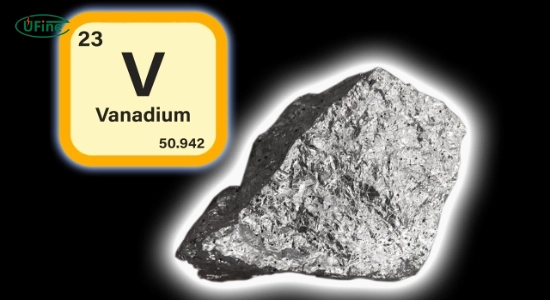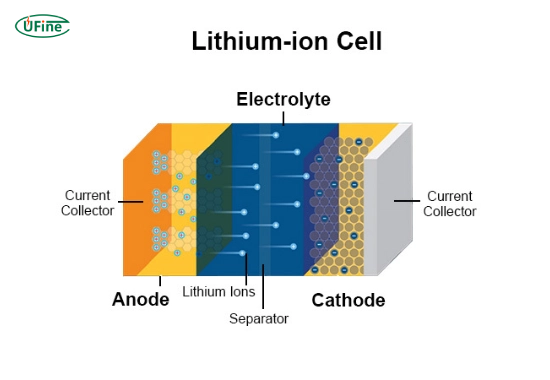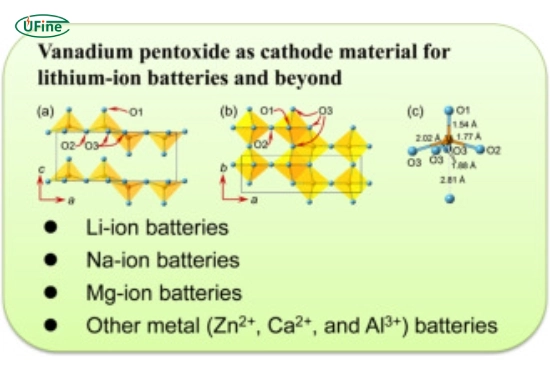The rapid growth of renewable energy, electric vehicles (EVs), and portable electronic devices has increased the demand for advanced energy storage solutions. Lithium-ion batteries dominate the market due to their high energy density and efficiency. However, as technology evolves, researchers and manufacturers continuously search for ways to enhance these batteries’ performance, lifespan, and sustainability. One promising development is the incorporation of vanadium into lithium batteries.
Vanadium, a transition metal known for its versatility, has emerged as a game-changer in battery technology. But how exactly does vanadium contribute to the efficiency and longevity of lithium batteries? This article dives deep into the role of vanadium, its benefits, and the future of energy storage systems.
Part 1. What is vanadium?
Vanadium is a rare, silvery-gray metal highly valued for its strength, corrosion resistance, and ability to exist in multiple oxidation states. This unique property makes vanadium critical in chemical and energy-related applications.
Vanadium is widely used in steel alloys, catalysts, and, more recently, energy storage systems like flow and lithium-ion batteries. Its ability to enhance electrochemical reactions has become a key player in modern battery advancements.
Differences Between Flow Batteries and Lithium Ion Batteries
Part 2. What are lithium-ion batteries?
Lithium-ion batteries are rechargeable batteries that power most of today’s electronic devices, from smartphones to EVs. Their popularity stems from their high energy density, lightweight design, and long cycle life. These batteries transfer lithium ions between the anode and cathode during charging and discharging.
Despite their advantages, lithium-ion batteries face challenges like capacity fading, overheating, and limited longevity. This is where vanadium comes into play, offering solutions to improve its performance and durability.
Part 3. How is vanadium used in lithium-ion batteries?
Vanadium is typically incorporated into lithium-ion batteries as a component of the cathode material or as an additive to improve electrolyte stability. Its multi-valence state enhances electron transfer within the battery, improving energy efficiency and longer cycle life.
Vanadium-based compounds, such as vanadium pentoxide (V2O5), are particularly effective in boosting the battery’s overall capacity. These materials are also known for their excellent thermal and structural stability, which helps reduce the risks of battery overheating and degradation.
Part 4. What are the benefits of using vanadium in lithium batteries?
1. Enhanced energy density
Vanadium improves the battery’s energy density by increasing the cathode’s ability to store and release energy. This translates to longer battery life between charges, making it ideal for EVs and portable devices.
2. Improved cycle life
Lithium-ion batteries with vanadium additives have been shown to maintain their capacity over more charge-discharge cycles. This is crucial for applications like renewable energy storage, where batteries must last for years.
3. Thermal stability
Vanadium compounds enhance the thermal stability of lithium batteries, reducing the risks of overheating and thermal runaway. This makes them safer for high-performance applications.
4. Faster charging times
The presence of vanadium facilitates faster ion movement, enabling quicker charging without compromising the battery’s lifespan.
5. Environmental benefits
Vanadium is more abundant and recyclable than traditional cathode elements like cobalt. Its use in lithium batteries can contribute to more sustainable energy storage solutions.
Part 5. How does vanadium improve battery efficiency?
Vanadium’s ability to exist in multiple oxidation states is the key to its contribution to battery efficiency. These states allow for faster electron transfer during the battery’s charge and discharge cycles, improving the overall performance. Additionally, vanadium compounds can stabilize the cathode structure, reducing energy loss and making the battery more efficient.
Part 6. What makes vanadium batteries different?
Vanadium is not limited to lithium-ion batteries. It is also the cornerstone of vanadium redox flow batteries (VRFBs). These batteries use vanadium ions in liquid electrolytes to store energy, making them ideal for large-scale energy storage systems like solar and wind farms.
While VRFBs are not as compact as lithium-ion batteries, they offer unmatched durability, scalability, and safety. vanadium’s dual role in lithium-ion and flow batteries underscores its versatility as a material for energy storage.
Part 7. What industries benefit most from vanadium-lithium batteries?
The integration of vanadium in lithium batteries has transformative potential across various industries:
- Electric vehicles (EVs): Longer driving ranges, faster charging, and enhanced safety.
- Renewable energy storage: Reliable and long-lasting storage for solar and wind power.
- Consumer electronics: Extended battery life for smartphones, laptops, and wearables.
- Aerospace and defense: Lightweight and durable batteries for critical applications.
Part 8. Challenges in using vanadium for lithium batteries
While vanadium offers numerous advantages, there are some challenges to consider:
- Cost: Vanadium is relatively expensive compared to other materials, which can increase the overall cost of the battery.
- Processing difficulties: Integrating vanadium into lithium batteries requires advanced manufacturing techniques.
- Resource availability: Although more abundant than cobalt, vanadium mining and extraction still face limitations.
Researchers are actively working on overcoming these challenges to make vanadium-based lithium batteries more accessible and cost-effective.
Part 9. What is the future of vanadium in lithium batteries?
The future of energy storage lies in innovation and sustainability, and vanadium is poised to play a significant role. With advancements in battery chemistry, manufacturing, and recycling, vanadium-enhanced lithium batteries could become the standard for high-performance energy storage.
Governments and industries are investing in vanadium mining and recycling programs, ensuring a steady supply of this critical material. As renewable energy adoption grows, the demand for efficient and durable batteries will only increase, cementing vanadium’s importance.
Part 10. FAQs
-
What is vanadium, and why is it essential in batteries?
Vanadium is a transition metal known for its multi-valence states, which enhance electrochemical reactions in batteries. It improves energy density, cycle life, and safety in lithium-ion batteries. -
How does vanadium improve lithium battery performance?
Vanadium enhances the cathode’s stability and facilitates faster electron transfer, improving efficiency, longevity, and thermal stability. -
Are vanadium-based batteries sustainable?
Yes, vanadium is more abundant and recyclable than cobalt, making it a more sustainable option for energy storage. -
What industries benefit from vanadium-lithium batteries?
Industries like electric vehicles, renewable energy, consumer electronics, and aerospace benefit significantly from vanadium-enhanced lithium batteries. -
What are the challenges of using vanadium in lithium-ion batteries?
The main challenges are the high cost of vanadium, processing complexities, and resource availability. However, ongoing research aims to address these issues.
Related Tags:
More Articles

How to Choose the Best Floor Scrubber Battery for Commercial Cleaning?
Selecting the ideal floor scrubber battery ensures a long runtime, rapid charging, and minimal maintenance for efficient commercial cleaning operations.
Battery for Blower vs Battery for Leaf Vacuum: Which One Should You Choose?
Battery for blower vs leaf vacuum—learn the key differences in power, fit, and runtime to choose the right battery for your outdoor tool needs.
How to Choose the Right Battery for Blower?
Choosing the right blower battery? Consider voltage, capacity, chemistry & usage. This guide helps match the best battery for peak performance.
How to Choose the Best Insulated Battery Box for Lithium Batteries?
Choosing the Best Insulated Battery Box for Lithium Batteries? Discover key factors such as size, material, and safety for optimal protection and performance.
7 Critical Elements on a Lithium Battery Shipping Label
What must be on a lithium battery shipping label? Learn 7 key elements to ensure safety, legal compliance, and correct handling across all transport modes.






